Evolutionary Computation: Toward a New Philosophy of Machine Intelligence, 3rd EditionISBN: 978-0-471-66951-7
Hardcover
296 pages
December 2005, Wiley-IEEE Press
 This is a Print-on-Demand title. It will be printed specifically to fill your order. Please allow an additional 10-15 days delivery time. The book is not returnable.
|
||||||
Preface to the Second Edition.
Preface to the First Edition.
1 Defining Artificial Intelligence.
1.1 Background.
1.2 The Turing Test.
1.3 Simulation of Human Expertise.
1.3.1 Samuel’s Checker Program.
1.3.2 Chess Programs.
1.3.3 Expert Systems.
1.3.4 A Criticism of the Expert Systems or Knowledge-Based Approach.
1.3.5 Fuzzy Systems.
1.3.6 Perspective on Methods Employing Specific Heuristics.
1.4 Neural Networks.
1.5 Definition of Intelligence.
1.6 Intelligence, the Scientific Method, and Evolution.
1.7 Evolving Artificial Intelligence.
References.
Chapter 1 Exercises.
2 Natural Evolution.
2.1 The Neo-Darwinian Paradigm.
2.2 The Genotype and the Phenotype: The Optimization of Behavior.
2.3 Implications of Wright’s Adaptive Topography: Optimization Is Extensive Yet Incomplete.
2.4 The Evolution of Complexity: Minimizing Surprise.
2.5 Sexual Reproduction.
2.6 Sexual Selection.
2.7 Assessing the Beneficiary of Evolutionary Optimization.
2.8 Challenges to Neo-Darwinism.
2.8.1 Neutral Mutations and the Neo-Darwinian Paradigm.
2.8.2 Punctuated Equilibrium.
2.9 Summary.
References.
Chapter 2 Exercises.
3 Computer Simulation of Natural Evolution.
3.1 Early Speculations and Specific Attempts.
3.1.1 Evolutionary Operation.
3.1.2 A Learning Machine.
3.2 Artificial Life.
3.3 Evolutionary Programming.
3.4 Evolution Strategies.
3.5 Genetic Algorithms.
3.6 The Evolution of Evolutionary Computation.
References.
Chapter 3 Exercises.
4 Theoretical and Empirical Properties of Evolutionary Computation.
4.1 The Challenge.
4.2 Theoretical Analysis of Evolutionary Computation.
4.2.1 The Framework for Analysis.
4.2.2 Convergence in the Limit.
4.2.3 The Error of Minimizing Expected Losses in Schema Processing.
4.2.3.1 The Two-Armed Bandit Problem.
4.2.3.2 Extending the Analysis for “Optimally” Allocating Trials.
4.2.3.3 Limitations of the Analysis.
4.2.4 Misallocating Trials and the Schema Theorem in the Presence of Noise.
4.2.5 Analyzing Selection.
4.2.6 Convergence Rates for Evolutionary Algorithms.
4.2.7 Does a Best Evolutionary Algorithm Exist?
4.3 Empirical Analysis.
4.3.1 Variations of Crossover.
4.3.2 Dynamic Parameter Encoding.
4.3.3 Comparing Crossover to Mutation.
4.3.4 Crossover as a Macromutation.
4.3.5 Self-Adaptation in Evolutionary Algorithms.
4.3.6 Fitness Distributions of Search Operators.
4.4 Discussion.
References.
Chapter 4 Exercises.
5 Intelligent Behavior.
5.1 Intelligence in Static and Dynamic Environments.
5.2 General Problem Solving: Experiments with Tic-Tac-Toe.
5.3 The Prisoner’s Dilemma: Coevolutionary Adaptation.
5.3.1 Background.
5.3.2 Evolving Finite-State Representations.
5.4 Learning How to Play Checkers without Relying on Expert Knowledge.
5.5 Evolving a Self-Learning Chess Player.
5.6 Discussion.
References.
Chapter 5 Exercises.
6 Perspective.
6.1 Evolution as a Unifying Principle of Intelligence.
6.2 Prediction and the Languagelike Nature of Intelligence.
6.3 The Misplaced Emphasis on Emulating Genetic Mechanisms.
6.4 Bottom-Up Versus Top-Down.
6.5 Toward a New Philosophy of Machine Intelligence.
References.
Chapter 6 Exercises.
Glossary.
Index.
About the Author.



